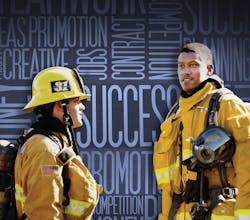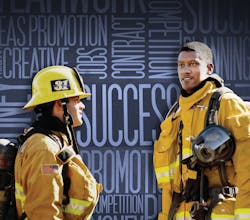Higher Education: Much More Than Checking the Box
“You just need a degree to check the box.” Have your ever heard this, or possibly been the one to say it? This usually comes when a college degree, or a number of credits, is required to qualify for a promotion or special assignment. But what do we mean by “check the box”? What does that mean to you?
I think that most of the time it is a harmless statement that is not necessarily said with malintent, but certainly is not meant to be complimentary, either. It does seem, however, to lend itself to the perception that the required collegiate experience does not mean anything other than meeting a minimum standard, and in some cases, this may even be true. But what is that minimum standard, why does management require it and why do we marginalize it?
The complexities of the job
When you began your career as a firefighter, you most likely went through a period of intensive, procedurally structured, skill-based training. To be a firefighter, you must be able to understand the use and functionality of apparatus and tools, as well as the basics of fire dynamics and physics. You are trained on your department’s rules, regulations and standard operating procedures. This is all well and good, but the curriculum is rather reactive and almost entirely procedural in nature.
While skills-based training provides the necessary foundation for a career in firefighting, what happens when a situation arises that doesn’t fall in line with one of your standing orders or procedures? What if the organization needs someone to manage people? Or to handle citizen complaints? Or PIO duties? Or is faced with significant change? What if a problem arises that you were not taught to handle in fire school? In most cases, we rely on more advanced, procedurally formatted skills-based classes. While these do provide for a transition to the next level of growth, they are simply a more advanced version of the courses in fire school.Today’s fire service is becoming ever-more complex when it comes to calls for service, equipment, inter-agency collaboration, politics, funding, social issues, national security, etc. You name it, it is more complex than ever—and this trend is only going to continue. Unfortunately, there is no way to create a policy or procedure to make decisions in this space. It is going to take a workforce with more advanced skills, thought processes, decision-making capabilities and communication abilities; a workforce that current fire department training is unable to build. This is where collegiate influence may just be the answer.
Look to law enforcement
While little research has been published on the effects of higher education on the fire service and its members, data exists on our brothers and sisters in blue. This research could be due to the more advanced professionalization of the law enforcement field and its close relationship with the legal field, which is steeped in higher education. Nonetheless, there have been several research studies published on the effects of higher education on law enforcement officers. A study by Jason Rydberg and William Terrill showed that officers with advanced degrees were significantly less likely to use force as their first option to gain compliance.1 In addition, they demonstrate better overall job performance and are better suited to secure advancement opportunities.
Another study, by Rebecca Paynich, identified many benefits of officers attaining higher education.2 This is a comprehensive summary of her findings that are, in my opinion, applicable to both law enforcement and the fire service alike. Law enforcement officers—or fire service personnel for our purposes here—with college educations:
- Experience better oral and written communication skills
- Display clearer and more innovative thinking
- Experience greater adaptability to and tolerance of organizational change and cultural diversity
- Are better equipped to deal with criticism, change, workload and stress
- Experience fewer on-the-job injuries and less misuse of sick leave (related to more ethical behavior)
- Experience fewer administrative and personnel problems and preventable accidents
- Are more proficient in technology
- Experience fewer departmental disciplinary actions and internal investigations
- Value intellectual and personal growth
- Have a higher level of problem-solving abilities and performance
- Are better at resolving conflicts
- Make better discretionary decisions and place higher value on ethical conduct
- Have decreased dogmatism, authoritarianism, rigidity and conservatism
To ease discussion, I grouped the above findings into three broad categorical topics: communication, open-mindedness and ethics.
Communication
I cannot express enough the importance of having effective communication skills. Wars begin and end with communication. Through the pursuit of higher education, you are required to communicate constantly, whether it be verbally during class discussion or debate, in the authoring of written reports and papers, or via your actions. You not only better your personal written prose, but also become more insightful as to the full impact of your communications as you grow your education.
Good communication skills are invaluable. Accurate, concise communication is necessary in every corner of the fire service, from sending a memo to the chief to documenting the events of a call. We often deal with citizens during some of their most stressful, traumatizing days. Effective communication can bring calm and order to a situation or can change the course or outcome of an operation.
Open-mindedness
This is one of the most versatile and impactful benefits of higher education. The fire service desperately needs more leaders and free thinkers who are not imprisoned by outdated practices. This ideology is embodied in many of the above research findings, including innovative thinking, adaptability, better acceptance of critical feedback, and higher tolerance of differing opinions and diversity.Of the research findings, one that seemed to speak the loudest in regard to the fire service was the measured decrease in dogmatism, authoritarianism, rigidity and conservatism. These are the ideologies that represent the all too familiar thought, “This is how we have always done it!” This statement alone is one of the most significant roadblocks to improvement and advancement in the fire service; whether it be decreasing line-of-duty deaths, increasing cultural diversity or accepting that we need to embrace higher education.
The collegiate atmosphere is one that encourages challenging the norm and being able to defend your position as well. This is where innovation lies—being able to think outside the box while supporting your notions, as well as respecting the same of others. I am not saying that we need to abandon all tradition, but rather that we cannot continue to look solely to the same outdated methods to tackle new challenges.
Ethics
There is a sacred component of every relationship between public safety professionals and the general public: trust. Each time this is damaged, it takes exponentially longer to repair, and is slightly eroded for the long term. I don’t believe, however, that all ethically flawed decisions are made intentionally. Rather, some are simply the result of an immature or uninformed decision-making process.
Most higher education programs include some sort of ethics curriculum. This can help you to not only recognize an ethical issue, but to use a sound decision-making process in order to remain above board. This process may include philosophical ideologies, case law or even historical events. In addition, solid ethical principle is built into well-respected collegiate programs. There is a sense of accountability for meeting deadlines, for respecting the thoughts and intellectual property of others, and for continuing to work as a contributor to the body of knowledge for your chosen career field or area of study.
When managers seek higher education, it is because they realize that the organizational challenges that lie ahead require a succession plan inclusive of a more advanced workforce that is capable of realizing the organization’s vision moving into the future. By checking that box, you are showing that you meet that requirement. It means that you are able to set a goal, lay out a plan of action, think critically to mitigate any issues or adversity encountered (displaying the aforementioned attributes), and see it through to the end.
Checking that box is more than meeting a minimum requirement. It is indicative of your ability, desire and willingness to persevere; to reach a goal set by an accredited university that is part of a standardized educational system.
References
1. Rydberg, J., & Terrill, W. “The Effect of Higher Education on Police Behavior.” Police Quarterly. 13:1 (2010), pp. 92–120. doi.org/10.1177/1098611109357325
2. Paynich, R. The Impact of a College-Educated Police Force: A review of the literature. February 2009. www.masschiefs.org/files-downloads/hot-topics/96-the-impact-of-higher-education-in-law-enforcement-feb-2009-and-summarypdf/file
About the Author
Glenn James
Glenn A. James II is a 14-year member of the Anne Arundel County, MD, Fire Department, currently serving as captain. During his career, he has served as a firefighter, paramedic/tactical medic, fire marshal and company officer. James has a master’s degree in organizational leadership from The Johns Hopkins University, as well as undergraduate degrees in public safety/fire department administration and EMT-paramedicine. He holds the designations of certified fire protection specialist from the NFPA and that of fire officer and fire marshal from the Center for Public Safety Excellence. James also serves as the president of the Anne Arundel County Professional Firefighters Burn Foundation.


